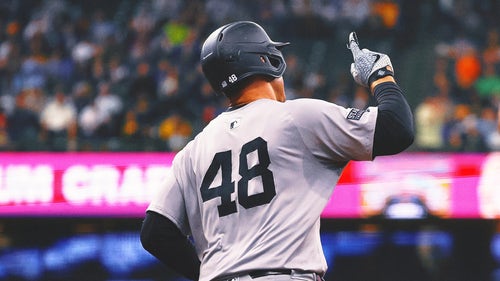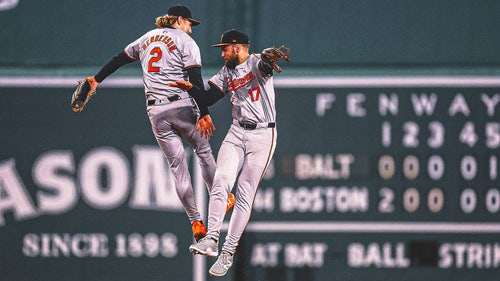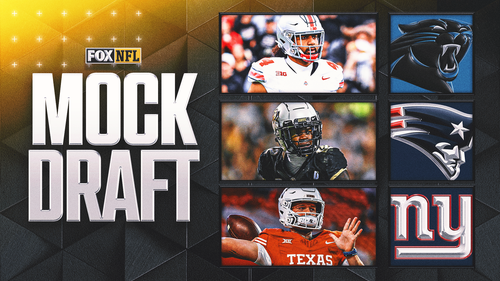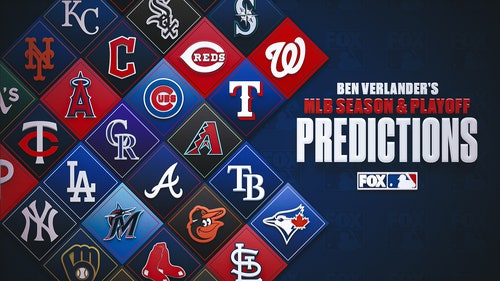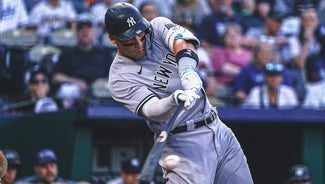
Five observations from Dodgers-Padres' Seoul Series
Goodbye, 162-0.
The most expensive pitcher in baseball failed to reach the second inning in his major-league debut Thursday as the revamped, juggernaut Dodgers roster fell on the wrong side of a slugfest Thursday. The Padres chased Yoshinobu Yamamoto early and held on late in a 15-11 win to split the two-game Seoul Series in Korea.
MLB's opening series featured tons of hits, familiar faces in new defensive places and some unexpected controversy. Here's what we learned.
1. Yamamoto's major-league debut was a short mess
The best part about Yamamoto's MLB debut is that it's over.
It was easy to look past his 8.38 Cactus League ERA, knowing he was likely working on new things as he adjusted to the major-league game. He still struck out 14 batters in 9.2 innings, and judging anyone on spring success is a flawed exercise. But the hits kept piling on as the team left Arizona for Seoul.
Yamamoto's first pitch Thursday was lined 105.4 mph off the bat for a base hit by Xander Bogaerts to start Game 2 of the Seoul Series in Korea. It was a harbinger of things to come.
The start to Yamamoto's major-league career went like this: hard-hit single, hit by pitch, hard-hit two-run triple (the first extra-base hit of the Seoul Series), walk, hard-hit sac fly, wild pitch, strikeout, RBI double (under the glove of Max Muncy), hard-hit RBI single, strikeout.
The lack of control was especially baffling for a player whose pinpoint command helped the 25-year-old Japanese sensation dominate Nippon Professional Baseball to the tune of three straight league MVPs, triple crowns and Sawamura Awards (the equivalent of the Cy Young) and made him the highest-paid pitcher in baseball history without ever having thrown in a major-league game.
Last year in NPB, Yamamoto allowed 22 earned runs and threw one wild pitch in 171 innings. On Thursday, he allowed five earned runs and threw one wild pitch in one inning. His day ended there at 43 pitches, making him the first Dodgers starter ever to allow at least five runs in an inning or less in his debut. Even if some growing pains were expected in his transition to MLB, no one could've anticipated the degree of this dud.
"It's not about the stuff," manager Dave Roberts told reporters. "When you're a command guy, which he's been his entire career, his life, and you just misfire, get behind in counts, hit batters, that's just not who he is. We've just got to get back to refining the delivery, tightening the command, and he'll be fine."
There will be better days ahead. It certainly can't get much worse than Thursday.
The one silver lining to the foreboding start? …
2. Almost every pitcher struggled at the Gocheok Sky Dome
Had Yamamoto been the only pitcher to struggle in the series, it would've felt more problematic. But as abysmal of a night as it was for the rookie, he was far from alone.
None of the starting pitchers in the two-game series looked like the usual versions of themselves. In Game 1, Tyler Glasnow walked four and struck out three while Yu Darvish issued three free passes and lasted only 3.1 innings. In Game 2, both Yamamoto and Joe Musgrove allowed five runs. While Musgrove outlasted Yamamoto, he went only 2.2 innings.
Two players the Padres received in the Juan Soto trade to the Yankees appeared, and it was a rather inauspicious start for both. Jhony Brito suffered the loss in Game 1, allowing a single, a walk and a game-tying sacrifice fly in the eighth inning to the only three batters he faced. Michael King secured the win in Game 2, pitching the bulk of the outing after Musgrove's abbreviated appearance, but allowed three runs on four hits and three walks. He did, however, lead all pitchers on both teams with five strikeouts.
The Dodgers didn't play a single game last year in which they had both recorded and allowed 13 hits. On Thursday in Seoul, they had already reached those marks before the start of the seventh inning. Four of the six Padres pitchers and five of the seven Dodgers pitchers who entered Thursday allowed at least one run.
All that to say, it's tough to glean too much from the pitching performances in the absurdly run-heavy environment. The ball at the Gocheok Sky Dome didn't carry, as a multitude of deep drives consistently died at the warning track, yet a seemingly endless supply of hits and runs still cascaded down.
The startling final score of 15-11 could've been even more inflated. Shohei Ohtani had three hard-hit balls launched more than 350 feet through the air that all died at the track. All three would have been home runs in at least one major-league ballpark. Mookie Betts and Jackson Merrill also had doubles that would have been homers in the majority of MLB parks.
3. Good and bad news for left side of Dodgers infield
Infield defense was the biggest question mark for the revamped Dodgers roster entering the 2024 season. Betts was expected to take on a full-time role at second base until Gavin Lux's throwing issues at shortstop in the spring forced a switch from the Dodgers, who bumped Betts to shortstop and Lux to second base.
Both players passed their first test.
Betts and Lux successfully turned double plays in both games of the series. More importantly, they also converted the routine grounders.
While Betts flipped from second to shortstop, Bogaerts made his move from shortstop to second base and looked pretty comfortable with the transition. He converted a diving play early in Game 2, and while he was unable to secure a diving attempt up the middle later in the game on a two-run Betts grounder that squirted away, it was still overall a success.
The moves for Betts and Bogaerts clearly had no adverse impact on their hitting. Both players recorded two hits in Game 1. Bogaerts did the same in Game 2 while Betts went 4-for-5, launching the first home run of the 2024 season and knocking in six runs in a game for the first time since 2017. It was the second time in Betts' career that he tallied six RBIs as the leadoff hitter.
More troubling for the Dodgers were the defensive struggles that continued at third base for Muncy, who committed two fielding errors in Game 2 and could've been charged with a third on Luis Campusano's double off Yamamoto in the first inning, which snuck under his glove on a play down the line. Muncy committed a National League-leading 16 errors at third base last year and graded in the bottom four in outs above average among qualified players at the position.
4. Jackson Merrill and Luis Campusano look ready to extend the Padres' lineup
The 20-year-old prospect may have gone hitless in his first game as a major-leaguer, but it was evident from the start of the Seoul Series that Merrill was not about to be overmatched in his jump from Double-A to MLB.
All three of Merrill's plate appearances in Game 1 ended in hard-hit outs. In Game 2, he was rewarded for his hard contact, ripping a 106.9 mph double that would have been a home run in 23 ballparks and a single that traveled 102.3 mph off the bat.
The Padres needed more firepower in the lineup with Soto no longer part of the group, and it looks like Merrill and Luis Campusano are capable of providing it.
Campusano has long been considered the future at the catcher spot in San Diego, but he has either been injured or in a backup role for most of his career since getting called up as a 21-year-old in 2020. Now might be his time. After slashing .331/.375/.500 in 42 games in the second half of the 2023 season, Campusano picked up where he left off in Seoul, tallying three hits and knocking in two runs in Game 2.
5. Alleged gambling scandal hangs peculiar cloud over Seoul Series
Ippei Mizuhara was on the field alongside Ohtani as his close friend and translator for all six years with the Angels — and for one game with the Dodgers.
Shortly after Game 1 of the Seoul Series, the L.A. Times reported that Ohtani's representatives accused his interpreter of engaging in a "massive theft" of Ohtani's funds to allegedly pay off Mizuhara's illegal gambling debts. Before the start of Game 2, Mizuhara had already been fired by the Dodgers. The team offered no further comments, and Ohtani declined to speak to the media following Thursday's game.
ESPN reported that at least $4.5 million in wire transfers were sent from Ohtani's bank account to a bookmaker.
According to ESPN, Mizuhara originally told the outlet in an interview that he had asked Ohtani to help pay off his gambling debts before recanting that version of events and claiming that Ohtani had no knowledge of the debts or the payments. He added that none of the bets were on baseball.
Roberts said he didn't think the off-field revelations made it more difficult for his team to lock in during Thursday's 15-11 loss. But the news involving Ohtani, a notoriously private person who has largely managed to stay out of the headlines despite his massive fame, still came as a major shock.
Ohtani is not currently under investigation or facing discipline by MLB. He was in the lineup for Game 2 of the series and went 1-for-5. On Thursday, Dodgers manager of performance operations Will Ireton served as Ohtani's interim interpreter and Yamamoto's in-game interpreter.
The Seoul Series is over, but this story will linger until more details emerge. There are still a lot more questions than answers as the Dodgers return stateside.
Rowan Kavner is an MLB writer for FOX Sports. He previously covered the L.A. Dodgers, LA Clippers and Dallas Cowboys. An LSU grad, Rowan was born in California, grew up in Texas, then moved back to the West Coast in 2014. Follow him on Twitter at @RowanKavner.






































































































































